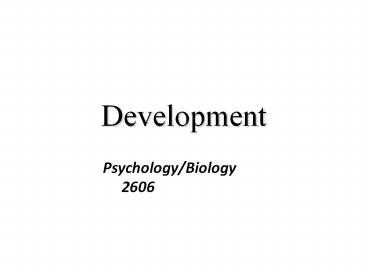Development - PowerPoint PPT Presentation
Title: Development
1
Development
- Psychology/Biology 2606
2
Introduction
- Brain development and behaviour development
should go together - We can look at this in three ways
- Structural development and behavioural changes
- Switch it around, look at behaviour and infer
neural mechanisms - Look at factors that affect both
3
Some Issues
- Preformation
- Embryos of different species are not that
dissimilar - All vertebrates have a forebrain, brainstem and
neural tube as embryos
4
(No Transcript)
5
Gross development
- When a Mommy and a Daddy really like each
other... - Primitive body at 15 days
- Neural plate at about 3 weeks
- Plate curls up, forms the neural groove, this
becomes the neural tube - By 49 days pretty person like
6
Generally
7
(No Transcript)
8
Peepees and weewees
- Sexual differentiation is going on throughout
this process too - This is important because testosterone basically
masculinizes the foetus - Not just the genitals, but also the brain
9
Stem Cells
- Neural stem cells line the neural tube
- These divide quickly
- Unlike adult stem cells, these guys divide and
divide again, like well, like 'normal' (non
neural) cells - Adult stem cells divide, but then one daughter
cell dies! - Stem cells become neuroblasts or glioblasts
10
Differentiation
- How the heck does a cell know what sort of cell
it is supposed to become? - Genes turned on and off
- Chemical environment
- EGF -gt progenitor cells
- bFGF -gt neuroblasts
- At peak growth rates we are making 250 000 cells
a MINUTE!
11
Stages in brain development
- Cell birth
- Migration
- Differentiation
- Maturation
- Synaptogenesis
- Cell death
- mylenogenesis
12
Generation, migration and differentiation
- Much easier to fix trauma if early on
- Migration takes about oh 6 to 7 weeks
- Then differentiation kicks in
- Cells formed in a particular region differentiate
into different types of neurons - Follow the radial glial road (very cool)
- Layers of cortex develop from the inside out, as
you would expect
13
(No Transcript)
14
Maturation
- Dendritic branching starts
- Dendrites grow slowly, whereas axons grow quite
quickly - Basically axonic growth is guided by various
molecules, and concentrations of these chemicals
tell the axon where to go
15
Synapses
- 1 00 000 000 000 000 synapses....
- OK so that is a lot
- Basically, couldn't just be programmed
- Must be again chemical messages saying go here or
there
16
Cell Death
- Neural Darwinism
- Use it or lose it basically
- If a cell does not get NGF it dies
- So if many cells are competing for one synapse,
the one that gets the NGF wins, others die - Brains are expensive, they should be efficient
17
Behaviour and Brain
- Motor stuff
- Flex joints at birth
- One month, orient hand
- 8 months or so, pincer grip
- Could be to do with formation of myelin
18
Language
- At birth, babies cry, basically hunger and
discomfort - Cooing and babbling
- Intonation changes
- 12 month old often has a vocabulary of oh 10
words or more - 2 year old may know 300 words
- 3 year old as many as 1000
19
- 4 year old, 1500, uses sentences, understands
number - By 6 a kid can understand tens of thousands of
words, uses maybe 2000 usually - An adult may have a vocabulary of 50 000!
- Could be correlated with dendritic development in
Broca's area
20
Cognitive development and the brain
- Kinda tough to correlate them
- You can look at Piagetian (sp?) stages, and the
data are suggestive - There are growth spurts that happen roughly in
time with these. - But, beyond that there may not be much
21
Environmental effects
- Enriched rats
- More cortex
- Better at mazes
- Plasticity decreases with age
- Basically experience fine tunes connections
- Critical periods and sensitive periods
22
Bad stuff
- Romanian orphans
- If adpoted early, they are pretty much ok
- Later, well, the later they were adopted, the
poorer their health in general, and their IQ
scores were well below average - Crack babies
- More the result of the lifestyle than the coke































